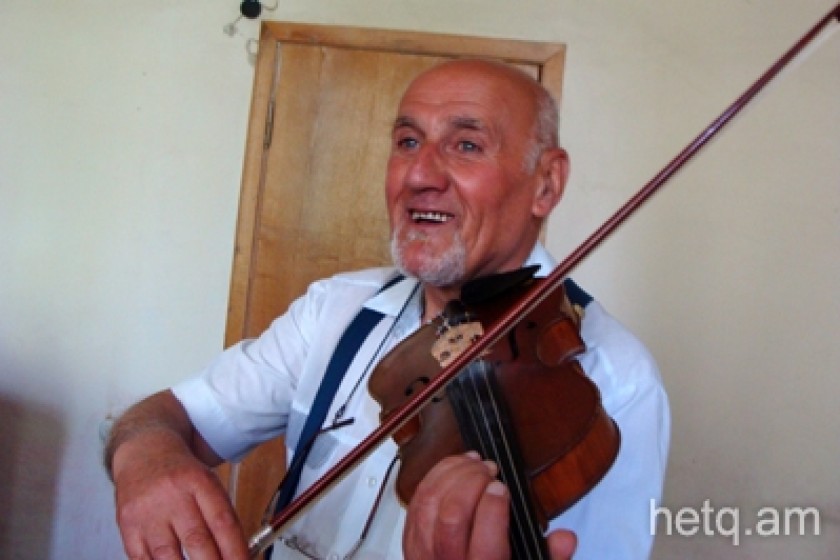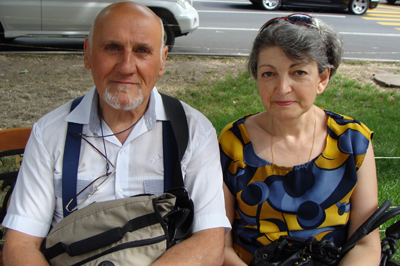
From WW II Germany to Gyumri: After 70 Years, Hans Raukhberger becomes Yuri Avedisyan
Almost everyone calls him Yuri, only his closest friends call him Hans, the name he was born with.
He speaks Armenian fluently, especially the Gyumri dialect, shares the unique sense of humor the proud locals display and attends the Armenian Apostolic faith. It’s hard to comprehend that Yuri is of German origin.
It’s tough to accurately define what Hans’ birth date is, at what age he arrived in Armenia, and other circumstances of his early childhood. What is known is that he began first grade in Gyumri.
During WWII, while the city of Bonn was being bombed, a Soviet army officer from officer from Gyumri took Hans from his German parents and brought him to the safety of Gyumri. The plan was that he would return Hans back to his parents once the war ceased.
The birth certificate of Hans Raukhberger of the day records ‘Yuri Avedisyan’ as his official name and ‘1937’ as his birth year. The Gyumri officer never sent Hans back to Germany because he had no children of his own and decided to keep Hans.
Throughout the next 70 years, Hans never stepped foot in Germany. “Who would I go to see? Where would I go?” he says. He vaguely remembers his German parents. He explains how his birth parents never searched for him, concluding that they didn’t do so because they were a part of the military and odds are they died in the war. “If they didn’t die, they would have come looking for me,” assumes Hans Raukhberger. Hans never searched for his biological parents because doing so was banned during the Soviet era.
His Gyumri parents treated Hans with a lot of kindness. Both unfortunately passed away about ten years ago. After their death, Hans settled in Yerevan.
When Hans first came to Armenia he would communicate with hand and foot gestures. Shortly thereafter he started speaking Armenian. Today, he understands German, but doesn’t speak it.
“I have suppressed and eventually terminated all emotions toward that language and culture so that I am not tempted to think about going there. Armenia is my country. I was born there and that’s the end of it. When I arrived in Gyumri, I was taught Armenian as well as Russian at school. There was no talk about learning German back then. When I remember Germany thoughts of blood, fire and distress emerge. I have no fond memory of Germany,” reveals Hans.
Hans does confess that German still floats around in his head and if he were to open a German textbook, it would just take him 2-3 weeks to start speaking German again. Our subconscious has a ‘black box’ in which it stores details from our memories-within Hans’ ‘black box’ is the German language.
For the past ten years, Hans spent most of his free time creating wooden sculptures and masks. He sculpts faces that are in his subconscious. He has between 30-40 sculptures. People have purchased some and taken his artwork abroad. Though his talents are very apparent, he refuses the proposal of having an exhibition to display his artwork.
Hans has been a violin instructor for over 50 years. He teaches at the Pedagogical University, and at the Tchaikovsky and Spendiaryan music schools. He instructs 15 students and throughout his career span, a few hundred have been taught by him. A handful of his pupils have become laureates in competitions and professors, though Hans firmly states that he is not a professor nor wants to be one.
At a young age, Hans was not that keen on playing the violin but as the years progressed he grew fond of the instrument and studied it. Playing it today gives him emotional satisfaction. “As I dove deeper into art and music and its psychology, its philosophy, my passion for music blossomed,” he says.
 |
| Hans Raukhberger (Yuri Avedisyan) with his wife Rouzanna Javakhyan |
Hans portrays certain German characteristics and qualities. He claims to have never been late or missed a day of work over the span of 50 years. It doesn’t please him to see people in Armenia do the bare minimum and slack off when it comes to their jobs and careers.
“Armenians are capable, talented people, but they are lazy and don’t want to work, they don’t want to put their abilities to good use. Germans and Jews, for example, are not as talented as Armenians but they sure are diligent,” describes Hans.
Hans doesn’t tolerate Armenians who demonstrate obnoxious behavior and rude treatment of others. He notes that the more one advances and enjoys new successes within the workplace, the more his co-workers become jealous and don’t look out for the successor’s best interest. “In other countries, one’s good work is complimented, but here, they don’t like it when one does well,” he says.
According to Hans, unlike Armenia, human contact in other European countries is based on a foundation of mutual respect. “They are obnoxious and loathsome here. I am no woman but when I look into the eyes of the men here, I get scared. You walk down the street, you look at a male’s face and it is not appealing. In Switzerland or Germany, or any other region, when you walk out into the street others look at you with a smile on their face and sometimes even make small talk which allows you to enjoy your walk and feel that human interaction.”
What concerns Hans Raukhberger is not the materialistic things but the atmosphere and environment that is established when talking to another in Armenia. Naturally, one should enjoy the discussion sparked between conversers. “Here, talks are not enjoyed because the other may express a certain statement but not act accordingly.”
Armenia’s current environmental condition, state of deforestation and desertification are also concerns for Hans. Other countries are surrounded with boundless trees and water, but for one to enjoy a nice time at Lake Sevan he must pay a large amount of money- that is just not feasible for locals here.
Hans has long thought about leaving Armenia, not because he wants to “satiate his stomach”. He isn’t ruling out Germany as an option either. However, Hans’ wife, Rouzanna Javakhyan who is an engineer, believes that even if it were viable to leave for Germany, Hans wouldn’t go. She states that ten days after leaving the country he would miss it terribly and return to Yerevan.
“Nowadays, he’ll occasionally say, ‘I should leave’ but then he’ll add, ‘where will I go, Armenia is my country’. I tried really hard to find his parents and went to the embassy. But Hans finally explained that even if he did find his parents, he would not go back because he doesn’t know anyone there and wouldn’t know what to do once there. Armenia is where he sees himself, where all his belongings, both materialistic and intangible are located,” states Rouzanna.
(Translated by Sanan Haroun)
 Videos
Videos Photos
Photos
Comments (1)
Write a comment